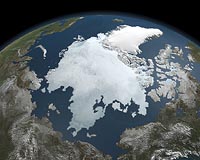 |
Paris (AFP) Jan 9, 2011 Global warming may wipe out three-quarters of Europe's alpine glaciers by 2100 and hike sea levels by four metres (13 feet) by the year 3000 through melting the West Antarctic icesheet, two studies published on Sunday said. The research places the spotlight on two of the least understood aspects of climate change: how, when and where warming will affect glaciers on which many millions depend for their water, and the problems faced by generations in the far distant future. The glacier study predicts that mountain glaciers and icecaps will shrink by 15-27 percent in volume terms on average by 2100. "Ice loss on such a scale may have substantial impacts on regional hydrology and water availability," it warns. Some regions will be far worse hit than others because of the altitude of their glaciers, the nature of the terrain and their susceptibility to localised warming. New Zealand could lose 72 percent (between 65 and 79 percent) of its glaciers, and Europe's Alps 75 percent, meaning a range of between 60 and 90 percent. At the other end of the scale, glacial loss in Greenland is predicted at around eight percent and at some 10 percent in high-mountain Asia. Meltwater will drive up world sea levels by an average of 12 centimetres (five inches) by 2100, says the study. This figure -- which does not include expansion by the oceans as they warm -- largely tallies with an estimate in the landmark Fourth Assessment Report by the UN's Intergovernmental Panel on Climate Change (IPCC) in 2007. Geophysicists Valentina Radic and Regine Hock of the University of Alaska base these calculations on a computer model derived from records for more than 300 glaciers between 1961 and 2004. The model factors in the middle-of-the-road "A1B" scenario for greenhouse-gas emissions, by which Earth's mean surface temperature would rise by 2.8 degrees Celsius (5.04 degrees Fahrenheit) during the 21st century. The tool was then applied to 19 regions that contain all the world's glaciers and icecaps. But -- importantly -- it does not include the icesheets of Antarctica and Greenland, where 99 percent of Earth's fresh water is locked up. If either of these icesheets were to melt significantly, sea levels could rise by an order of metres (many feet), drowning coastal cities. That very scenario emerges in the second study, which focuses on the inertial effect of greenhouse gases. Carbon molecules emitted by fossil fuels and deforestation linger for many centuries in the atmosphere before breaking apart. Even if all these emissions were stopped by 2100, the warming machine would continue to function for centuries to come, says the investigation. It largely bases its forecast on the "A2" emissions scenario, which sees greater carbon pollution by 2100, stoking Earth's temperature by an average 3.4 C (6.1 F) by century's end. Warming of the middle depths of the Southern Ocean could unleash the "widespread collapse" of the West Antarctic icesheet by the year 3000, it says. "The inertia in intermediate and deep ocean currents driving into the southern Atlantic means those oceans are only now beginning to warm as a result of CO2 (carbon dioxide) emissions from the last century," said Shawn Marshall, a professor the University of Calgary in Canada. "The simulation showed that warming will continue, rather than stop or reverse, on the thousand-year timescale." The two studies are published online by the journal Nature Geoscience.
Share This Article With Planet Earth
Related Links Beyond the Ice Age
 Arctic icecap safe from runaway melting: study
Arctic icecap safe from runaway melting: studyParis (AFP) Dec 15, 2010 There is no "tipping point" beyond which climate change will inevitably push the Arctic ice cap into terminal melt off, according to a study released Wednesday. The northern polar cap has shrunk between 15 and 20 percent over the last 30 years, unleashing concern that on current trends - with regional temperature increases twice or triple the global average - it could disappear entirely du ... read more |
|
| The content herein, unless otherwise known to be public domain, are Copyright 1995-2010 - SpaceDaily. AFP and UPI Wire Stories are copyright Agence France-Presse and United Press International. ESA Portal Reports are copyright European Space Agency. All NASA sourced material is public domain. Additional copyrights may apply in whole or part to other bona fide parties. Advertising does not imply endorsement,agreement or approval of any opinions, statements or information provided by SpaceDaily on any Web page published or hosted by SpaceDaily. Privacy Statement |